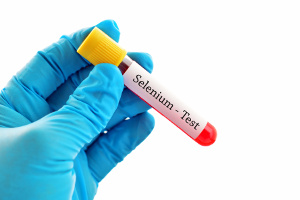Are you getting enough selenium for your thyroid and energy metabolism?
 Selenium is a trace element that plays a crucial role in the thyroid gland and the production of thyroid hormones. It also protects the thyroid from damage caused by oxidative stress, as highlighted in a review article published in Archives of Endocrinology and Metabolism. But how much selenium do we actually need for the thyroid and the many other selenium-dependent functions in the body?
Selenium is a trace element that plays a crucial role in the thyroid gland and the production of thyroid hormones. It also protects the thyroid from damage caused by oxidative stress, as highlighted in a review article published in Archives of Endocrinology and Metabolism. But how much selenium do we actually need for the thyroid and the many other selenium-dependent functions in the body?
The thyroid gland is located at the front of the neck and produces hormones that regulate the body’s overall energy metabolism. Interestingly, the thyroid contains more selenium per gram of tissue than any other organ. This is because selenium is a component of several selenium-dependent proteins that act as essential enzymes and protective antioxidants.
The thyroid needs iodine to produce thyroid hormones. T4 (thyroxine) contains four iodine atoms, and T3 (triiodothyronine) contains three. The thyroid mainly produces T4, which is an inactive precursor. When cells need energy, T4 is converted into the active T3 hormone by selenium-dependent enzymes called deiodinases, which remove one iodine atom from T4. T3 then facilitates the uptake of oxygen into cells, allowing them to convert calories from food into energy. This process is similar to adding oxygen to a fireplace - the more oxygen, the faster the fire burns.
For this reason, the ratio between T4 and T3 must be balanced, ensuring that metabolism - through the help of both iodine and selenium - functions optimally in response to the body’s needs.
Selenium also contributes to the powerful antioxidant enzymes known as GPXs (glutathione peroxidases), which protect the thyroid from damage caused by free radicals and oxidative stress. This antioxidant function is particularly important because the active thyroid gland is highly vascularized and therefore more vulnerable to oxidative damage.
The review article further explores the role of selenium in thyroid function. All in all, selenium is involved in about 25 selenium-dependent proteins that are vital for many other processes and for overall health. This includes selenium’s ability to neutralize and eliminate environmental toxins such as mercury.
Selenium deficiency can lead to thyroid disorders and other health problems
A growing number of people are unable to convert a sufficient amount of T4 into T3. This is a key reason for the growing incidence of hypothyroidism, which is a condition that affects significantly more women than men and becomes more common with age.
Hashimoto’s disease, the most frequent cause of hypothyroidism, often develops gradually and may even begin with temporary hyperthyroidism. Hashimoto’s is an autoimmune disorder, as is Graves’ disease, which causes hyperthyroidism. Both conditions are characterized by chronic inflammation and oxidative stress, which can damage various parts of the thyroid gland.
According to the review article, selenium deficiency may also contribute to reduced fertility in both men and women, growth problems during pregnancy, and a higher risk of miscarriage. It increases susceptibility to viral infections and the risk of complications. Several studies suggest a link between selenium deficiency and various forms of cancer, including thyroid cancer. Severe selenium deficiency (less than 10 micrograms per day) can lead to Keshan disease - a fatal heart condition triggered by an otherwise harmless virus (coxsackie) that has mutated. It can also cause Kashin-Beck disease, which results in deformities of joints and bones.
Selenium supplements may help prevent and support thyroid disorders
Several studies have shown that selenium supplementation can benefit patients with Hashimoto’s disease in a number of ways. Most of the studies used doses between 100–200 micrograms daily over periods of up to 12 months. Evidence also suggests that doses above 100 micrograms are needed for optimal activity of the selenium-based antioxidant enzymes (GPXs).
In the case of Graves’ disease, selenium supplementation has also been shown to improve symptoms and quality of life. Daily supplements of 200 micrograms of selenium have furthermore had a positive effect on Graves’ orbitopathy, which in severe cases causes bulging eyes and impaired vision.
Sources of selenium, recommended dosages, and supplementation
Selenium is found in fish, shellfish, organ meats, regular meat, and eggs. It is also present in grains, cruciferous vegetables, and other crops, although selenium levels vary greatly depending on the soil in which the food is grown. Brazil nuts are considered a particularly rich source. However, the average daily selenium intake in Europe is typically between 20-35 micrograms, which is far too low.
In Denmark, the official daily recommendation is 55 micrograms. However, the new Nordic Nutrition Recommendations recommends higher intakes: 75 micrograms per day for women and 90 micrograms for men.
Research now suggests that we may need closer to 100-200 micrograms daily to support thyroid function, cancer prevention, and other selenium-dependent roles. When taking supplements, it is advisable to choose selenium yeast, which contains a broad spectrum of different organic selenium compounds.
Since too much selenium can also be harmful, EFSA (the European Food Safety Authority) has set an upper safe limit of 300 micrograms per day.
References:
Luciana Sant´Ana Leone de Souza et al. Selenium nutritional status and thyroid function. Archives of Endocrinology and Metabolism. 2025 Feb.
Selenium-Rich Foods Can Support Thyroid Health: Nutritionist. 2025
Panida Potita et al. Selenium supplementation in inactive moderate to severe Graves´ orbitopathy patients: a randomized controlled trial. Orbit 2024
Fei Wang et al. Selenium and thyroid diseases. Frontiers in Nutrition. 2023
Nordic Council of Ministers. Nordic Nutrition Recommendations 2023
TIP! See also the related articles
Search for more information...
- Created on .








